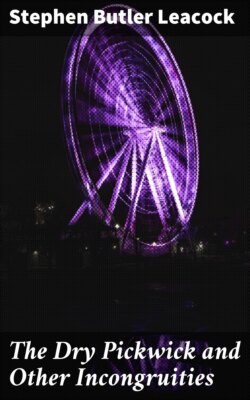Читать книгу The Dry Pickwick and Other Incongruities - Стивен Ликок - Страница 4
На сайте Литреса книга снята с продажи.
England’s Greatest Writer Adapted to America’s Greatest Legislation
ОглавлениеTable of Contents
INTRODUCTION
The demand from the American colleges for a revision of the works of Charles Dickens has now become so insistent that something must be done. “How can we put before the eyes of our literature classes,” writes the president of the Mush Academy, “such scenes as those of the Maypole Inn, or the taproom of the Ipswich White Horse?” “Our girls,” writes Professor Lydia Leftover, “are tough enough already. If they start to read the drinking episodes of the Pickwick Papers, we can’t hold them.” “We must have legislation in this matter,” declares a well-known Senator from a Middle West State. “Our people are accustomed to lean on legislation. They can’t progress without it. What we need is a State law to declare that Charles Dickens is not funny.”
“But would it not be the more moderate and sensible course,” so writes to me the president of a New England college, “if we could obtain a revised edition of the works of Charles Dickens, so made as to retain all the charm of character and humour and to leave out those features of social life not in harmony with our environment?”
Exactly. But can it be done? Let us take some of the most famous and typical episodes of the Dickens books and imagine them undergoing such a revision.
All the world knows, at first hand or at second or third, the Pickwick Papers. All the world has read or heard of such unforgettable episodes as the Christmas visit of Mr. Pickwick and his friends to the hospitable Manor Farm of Mr. Wardle of Dingley Dell. What would revision leave of such a page of life?
Let us recall it as Dickens wrote it.
Here is the rubicund and jovial Mr. Pickwick, together with his inimitable and immortal friends, setting out by coach to visit Dingley Dell. We recall the starting of the coach from the inn yard, the vast hampers with mysterious bottles clinking within them; the cracking of the whips of the merry postillions; the pauses by the way for a change of horses at the wayside inns where Mr. Pickwick and his friends descend from their perch to visit the bar. Here a rosy landlord behind the long mahogany dispenses sundry smoking punches and hot drinks redolent of gin and lemons. We recall the arrival at Dingley Dell with jolly old Wardle merrily greeting his friends; more punches: festivities within doors and festivities without; hot toddies, hot negus, sugar, lemons and spices—the very atmosphere of the West Indies wafted on the Christmas air of England; skating on the ice; whist, cards, and round games in the drawing-room; huge dinners and substantial suppers; the consumption of oysters by the barrel and spiced beef by the hundredweight; and through it all the soft aroma of hot punch, mulled ale, warmed claret and smoking gin and lemons; till at the end the merriment fades into somnolence and Mr. Pickwick and his friends sink into innocent slumber having broken enough laws—if the scene were in America—to have sent them all to the penitentiary for life.
Can such pictures be revised? We dare not read them as they stand. They would corrupt the young. Let us see what revision can do.
So here follows:—
